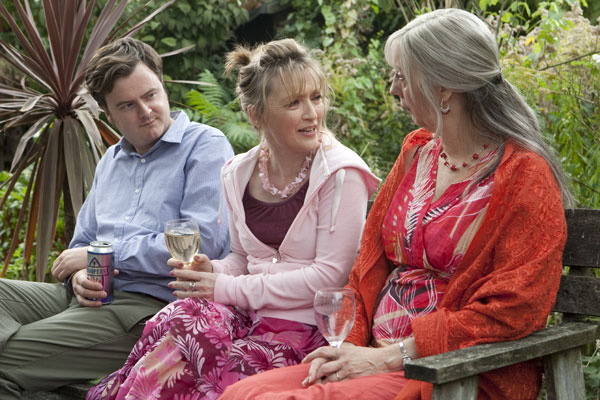
Mike Leigh’s newest, Another Year, opens with a bit of a red herring, if so we may call the grim visage of the stonily unhappy Janet (played by frequent Leigh collaborator Imelda Staunton, star of Vera Drake). For a minute it looks as though we’re doomed to two hours stomping through the misery of Janet’s life, which she ranks at her counselor’s probing as a 1 on a scale of 1 to 10 for happiness. And lord knows, such a film would be no surprise from Leigh.
But thankfully, we never see or hear of Janet again, and the life we stay with and get to visit, at seasonal intervals over the length of a gently passing year, is that of Gerri, the sympathetic yet clear-eyed counselor, and her genial geologist husband Tom. And gradually it dawns on one that Mike Leigh, who has certainly never shied from harsh story lines, has for this movie chosen that rarest and unlikeliest of subjects — that rarest of entities too — a happy and contented marriage.
Leigh regulars Ruth Sheen and Jim Broadbent give Gerri and Tom, her affable husband, the intimacy and easy rhythms of a long-lived and deeply connected couple. Their extremely pleasant life together consists of rewarding careers, Jim’s delicious homecooked meals, diligent weekends working their allotment vegetable garden, and visits from their loving, emotionally healthy and do-gooding 30-year-old son Joe.
In fact, it seems the only notes of disharmony that enter their lives comes from their less fortunate friends, most notably Gerri’s long-time coworker Mary, who fairly shakes off the screen in her frantic, tremulous energy. It would be kindest to say that Mike Leigh’s commitment to realism extends to his actors’ appearances; it would seem he has to go way out of his way to avoid casting the normally pretty folk who abound in the world of acting. So the adoration that Gerri and Tom have for each other has nothing to do with physical perfection. Gerri droops around in the same shapelessly flowered shifts and cardigans she’s worn since her hippie days, her long straight hair in a careless bun, no makeup at all on her toothy, frankly aging face.
This is by way of contrast with Mary, vain and insecure, a woman of a certain age who squeezes herself into push-up bras and tight wrap shirts. Prone to moroseness when deep in her cups, a condition that occurs frequently, Mary has much to regret. She’s made poor decisions, including a long relationship with a married man, and makes increasingly bad ones, including allowing herself the pathetic delusion that she might be a suitable romantic candidate for the twenty-years-younger Joe. Lesly Manville gives an amazing performance, moment-to-moment revealing new, brilliantly polished facets of Mary’s complex and contradictory character. Mary is good-hearted but grasping, despondent but valiant, impulsive, fatuous and sentimentalizing.
Mary’s not the only needy acquaintance. The jolly Tom’s older brother, Ronnie, is the polar opposite — unsuccessful, gruff, monosyllabically antisocial. When Ronnie’s wife dies, we see one of the most depressing funerals ever, where almost no one is in attendance and seemingly no one knew or loved the deceased, including Ronnie’s bitter and estranged son. There’s also a visit from Tom’s friend Ken (the amazing Peter Wight), who’s in many ways the male equivalent of Mary, only the buffalo to her hummingbird. Peter throws alcohol and food down his gullet at terrifying rates in a frenzied attempt to dull his wretchedness.
It’s not that Gerri and Tom can’t see their friends’ weaknesses. They even try, as Mary slips down a bad spiral, to give gentle words of guidance. But what they offer their friends, as they offer each other, is a quiet and steady belief in human goodness. I’m not so full of goodness, myself. I kept wondering why they don’t have at least a couple of other friends who aren’t quite so messed up.
Does the implicit comparison between their own bliss and their friends’ assorted anguishes not make them feel at least a bit self-congratulatory? Is there never any exchange of jealousy or judgment between Gerri and Mary? Never a ripple in Gerri and Tom’s domestic pond? Does Tom’s eye never wander, Gerri never weary of his numbing talk of rock and subsoils? Can any lives, any marriage, be truly so serene? Or are we seeing an idealization, what Mary wistfully sees? Perhaps these are these the questions Leigh wants us to ask, or the unease he wants us to feel, our own nasty impulses in the face of goodness.
Personally, I’m lucky to have a great life, with a loving partner and fabulous children and wonderful friends. Yet, as Gerri and Tom made tea in their large, sun-flooded kitchen, and read side-by-side in their flower-papered bedroom, so content and cozily domestic, I was filled with longing, as though I were as alone and desperate as Mary. At one point she gets so sloppily drunk while over for dinner that she has to spend the night in their guest bedroom.
The next morning, after being served breakfast, it’s time for her to head for home. And yet, she can’t seem to make herself leave. Tom, Gerri and Joe are busy lugging large bags of compost for the garden, ready to start their Sunday’s work, but Mary lingers on the sidewalk, chattering nervously, reluctant to leave the steady warmth of their lives, leaving and returning. About the way I felt when this irresistible movie ended.
